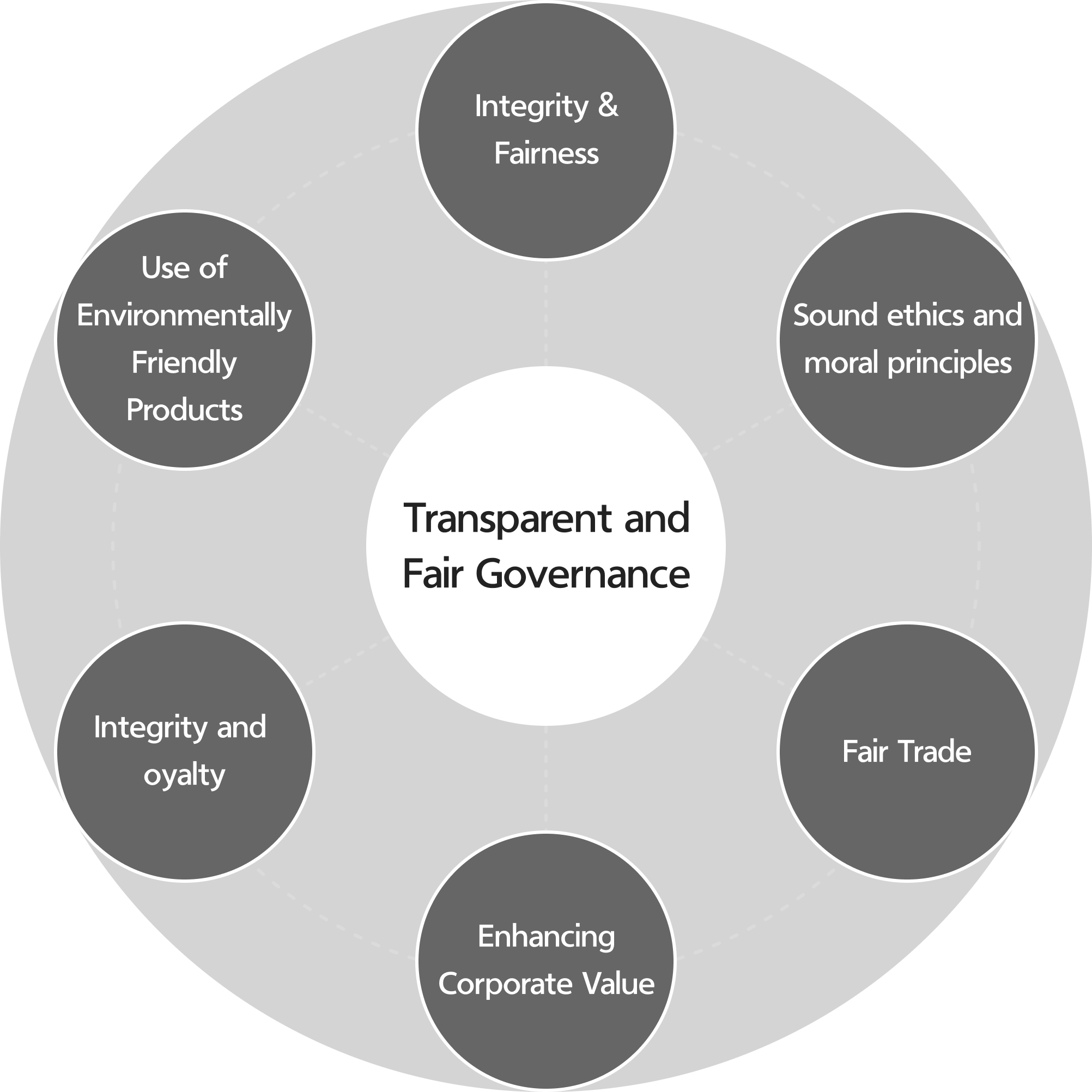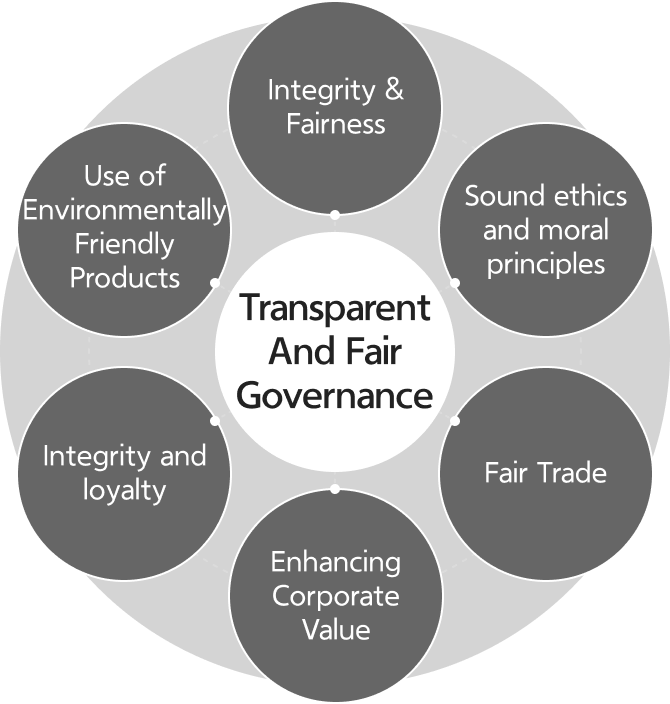Ethics & Compliance Management
We Are Committed To Practicing Fair Trade And
Ethical Management.
Hanwha Energy establishes and upholds its Code of Ethics and Ethical Guidelines,
striving to become a trusted integrated energy company for all stakeholders—
including customers, partners, shareholders, and employees—through fair trade and ethical business practices.
CEO’s Commitment to Compliance
Hanwha Energy declares its voluntary commitment to
fully comply with all fair trade-related laws and regulations.


Hanwha Energy intends to enhance its Fair Trade Compliance Program (CP) starting from 2026. To heighten compliance awareness throughout the company, Hanwha Energy will refine the existing CP system and establish a strong culture of compliance as a core value of the company by implementing effective measures such as CP trainings and engagement activities.
I, as CEO of Hanwha Energy, encourage all executives and employees to actively participate in our compliance management initiatives as we move forward together.
CEO Jaekyu Lee
Code of Ethics
All employees of Hanwha Energy hereby establish and promulgate the Code of Ethics,
which serves as the guiding standard for employee conduct and decision-making,
and solemnly pledge to uphold and faithfully adhere to its principles in our pursuit of
becoming a leading integrated energy company in South Korea.


-
Integrity & Fairness
We uphold integrity and fairness as the foremost principles of corporate governance, complying with all laws and social norms in economic and societal activities, respecting market economy order, and rejecting any form of unfair trade.
-
Use of Environmentally Friendly Products
Promote the preservation of ecosystems and optimize the use of resources and energy by utilizing safe and environmentally friendly products.
-
Integrity and loyalty
Based on integrity and loyalty, we engage sincerely with stakeholders—including customers, shareholders, competitors, and partners —to foster mutual coexistence and shared prosperity.
-
Enhancing Corporate Value
Clearly distinguishing between personal and professional matters, valuing the company’s assets, and striving to enhance corporate value.
-
Fair Trade
Leverage the wealth and corporate value generated through fair and transparent business practices to contribute to the welfare, education, culture, and employment growth of local communities.
-
Sound ethics and moral principles
Respect all employees as autonomous individuals and foster a supportive work environment that nurtures their growth as responsible corporate citizens guided by sound ethical principles.
Compliance Management Policy
Hanwha Energy Co., Ltd. hereby declares this Compliance Management Policy to enhance corporate value and establish a sustainable management foundation by ensuring that all executives and employees actively identify and comply with all applicable laws, internal regulations, and relevant compliance obligations.
-
Article 1 Duties of the Compliance Officer
The Compliance Officer shall establish, continuously manage, and improve a compliance management system that ensures the achievement of the objectives set forth in this Compliance Management Policy.
All members of the Company’s management shall actively support the Compliance Officer to realize this Policy and to ensure the effective operation of the compliance management system. -
Article 2 Compliance Obligations
All executives and employees of the Company shall pledge to comply with all applicable laws and internal regulations relevant to the Company’s business activities and shall faithfully fulfill their compliance obligations.
The Company shall foster a culture and working environment that promote compliance and shall provide the necessary information and training to enable all employees to fulfill their obligations under this Article. -
Article 3 Measures in Case of Non-Compliance
All employees of the Company must report immediately through designated channels to the Compliance Department any identified or suspected violation of compliance obligations.
Failure to report known or suspected breaches, or failure to take reasonable measures to prevent such violations, shall be regarded as a breach of duty.
In such cases, the Company may impose disciplinary actions in accordance with its internal employment rules and HR policies, which may include warnings, suspension, dismissal, or other appropriate sanctions depending on the severity of the violation. -
Article 4 Protection of Whistleblowers
The Company shall establish and operate a reporting system that allows employees to freely report any identified or suspected violation of compliance obligations.
The identity of the whistleblower, the content of the report, and any related information shall be kept strictly confidential.
The Company shall also ensure that no employee suffers any disadvantage or retaliation as a result of making such a report in good faith.
Code of Ethics
Hanwha Energy has established and implemented its Code of Ethics to pursue the satisfaction of customers,
shareholders, and employees; uphold fair and trustworthy business practices with partners; and fulfill its
responsibilities to the nation and society through principled ethical management.
-
Chapter 1: General Provisions
Article 1 [Purpose]The purpose of this Code of Ethics is to establish the standards for ethical decision-making and related matters for the implementation of ethical management at Hanwha Energy Co., Ltd.
Article 2 [Scope of Application]This Code of Ethics applies to all employees of Hanwha Energy Co., Ltd. as well as its business partners.
Article 3 [Definitions]1. Monetary or material benefits: Refers to cash, securities, goods, or any other economic advantages.
2. Entertainment and hospitality: Refers to meals, alcoholic beverages, leisure, recreation (including golf), and similar benefits.
3. Conveniences: Refers to any case where the recipient receives benefits such as accommodation, transportation, or support for events that cause economic loss to the provider, excluding monetary or material benefits and entertainment.
4. Business partners: Refers to all individuals and legal entities that have transactional relationships with Hanwha Energy Co., Ltd.
5. Stakeholders: Refers to all individuals, legal entities, or organizations inside or outside the company whose rights or interests are affected by the actions or decisions of employees. This includes hierarchical and work-related relationships within the company.
6. I nevitably received benefits: Refers to benefits that could not be refused due to the recipient’s absence, situations where firmly declining a favor would be considered impolite, or cases revealed through family, relatives, or acquaintances without the recipient’s awareness.
7. Socially acceptable range: Refers to benefits of a general, reasonable amount that are considered genuine, voluntary, and without expectation of return. -
Chapter 2: Responsibilities and Duties to Customers
Hanwha Energy is committed to consistently respecting the opinions of all customers and providing services and benefits from the customer’s perspective, thereby continuously creating valuable outcomes and earning their unwavering trust
Article 4 (Respect for Customers)1. Always listen attentively to customer feedback and prioritize customer satisfaction in all decisions and actions.
2. Interact with customers politely and professionally, maintaining a neat appearance and appropriate attire.
3. Prioritize handling customer-related tasks efficiently.
4. Respond to customer calls with courtesy, sincerity, and professionalism.Article 5 (Fulfillment of Promises to Customers)1. Always honor commitments made to customers.
2. In the event of any issues with customers, proactively take measures to minimize any potential impact on both the customer and the company.Article 6 (Providing Value to Customers)1. Recognize that the growth of customers equates to the growth of the company and strive to create the value customers require.
2. Deliver the highest quality products and services at reasonable prices, responding promptly and accurately to legitimate customer requests.Article 7 (Protection of Customer Interests)1. Respond swiftly to any customer complaints regarding products or services.
2. Refrain from unethical conduct in customer relationships, and do not use customer-related information for purposes other than those agreed upon or provide it to third parties without prior consent. -
Chapter 3: Compliance with Laws and Respect for Free Market Order
Hanwha Energy conducts its business in full compliance with all applicable laws and commercial practices in every region of operation, competing in a manner that ensures fairness and transparency.
Article 8 (Compliance with Laws and Commercial Practices)1. No employee shall engage in any activity that violates domestic or international fair trade laws.
2. Employees stationed overseas must familiarize themselves with local laws and commercial practices and ensure that their actions do not constitute violations.Article 9 (Respect for Free Market Principles)1. Engage in fair competition based on mutual respect with competitors, without infringing on their legitimate interests or exploiting weaknesses unfairly.
2. Acquire and use information about competitors through lawful and ethical means, and refrain from disclosing such information to external parties inappropriately, even if it concerns publicly available competitor data. -
Chapter 4: Pursuit of Mutual Growth with Partners
Hanwha Energy seeks to maintain mutual trust and cooperation through transparent and fair business transactions, striving for shared growth and development.
Article 10 (Fair Transactions)1. All qualified companies shall be given equal opportunity to participate as partners, with registration and selection conducted objectively and fairly.
2. All transactions must be conducted on an equal footing, with sufficient consultation regarding terms and procedures.
3. Any changes to transaction conditions shall be determined in mutual agreement with the partner company.
4. Partner evaluations shall apply objective and clear criteria to ensure fairness.Article 11 (Prohibition of Unfair Practices)1. When discontinuing business with a partner, clearly communicate the reasons and effective date to ensure objectivity and validity.
2. Ensure that no unilateral decisions using improper methods lead to termination of transactions, maintaining fairness.
3. Transferring costs to partners without prior consultation is strictly prohibited to preserve trust.
4. Employees shall not solicit or accept money, gifts, hospitality, or favors from partners by leveraging superior business positions. In unavoidable cases, such instances must be reported to the Ethics Management Office, which shall promptly arrange for return or, if return is not possible, donation in the name of the provider’s company.
5. Employees who become aware that supervisors or colleagues have accepted money, gifts, hospitality, or favors without taking proper action under this Code must report the matter to the Ethics Management Office.
6. For cases under Articles 4–5, the reporting party shall submit a “Report on Money, Gifts, or Hospitality Received” (see Appendix). Initial reporting may be made by phone or email, with the formal report submitted later.Article 12 (Pursuit of Mutual Growth)1. Strive to establish a transparent business culture through fair and rational transactional relationships.
2. Actively support partners’ long-term competitiveness and growth, and share the benefits generated from such cooperation. -
Chapter 5: Fundamental Ethics for Employees
Hanwha Energy requires all employees to uphold the values of corporate citizenship with strong ethical standards, contributing to personal and company growth through continuous self-development and fair performance of duties.
Article 13 (Basic Ethics)1. Take pride in being a member of Hanwha Energy and maintain honesty and integrity in all actions.
2. Promote effective achievement of the company’s goals and values through active cooperation and smooth communication with colleagues and relevant departments.
3. Strictly separate personal and professional matters; company assets or expenses must not be used for personal purposes.
4. Notify partners and other relevant parties of any personal events (e.g., weddings, condolences) to avoid imposing burdens.
5. Pursue self-development to cultivate the ability to lead and adapt to changing circumstances.
6. Conduct thorough safety inspections and management to prevent accidents, making every effort to ensure workplace safety.
7. Develop skills to respond to accidents or disasters through training and strictly adhere to safety regulations.
8. Respond promptly to incidents to ensure the safety of both the company and the local community.
9. Safeguard customer and internal information from unauthorized disclosure; only use licensed software for IT operations.Article 14 (Fair Performance of Duties)1. Perform all duties fairly and legitimately, complying with laws, internal regulations, and commercial practices.
2. Do not accept any economic benefits from stakeholders that could compromise fairness in work.
3. Avoid any unethical behavior that is socially unacceptable in professional or personal activities.
4. Supervisors must not instruct subordinates to perform tasks that violate laws, internal regulations, or commercial practices, including manipulating documents or figures. Subordinates may refuse such instructions without penalty and may report them to the company. Ignoring such directives when clearly unlawful is considered equivalent misconduct.
5. Providing false or misleading reports to management or third parties during business operations is strictly prohibited.
6. Employees reporting violations or cooperating with ethics investigations are protected from any adverse consequences; the Ethics Committee will ensure identity protection if necessary.Article 15 (Prohibition of Employee Financial Transactions, Solicitation, and Gift-Giving)1. Monetary lending, joint guarantees, or mutual sureties between employees are generally prohibited.
2. Employees must not solicit or accept any improper economic benefits through undue influence.
3. Gift-giving between employees is generally prohibited, except for socially acceptable instances such as:
- Voluntary gifts from supervisors to subordinates
- Low-value gifts exchanged among team members on birthdays or anniversaries
4. Contributions for personal events should be voluntary and socially appropriate.Article 16 (Prevention of Workplace Sexual Harassment)1. Avoid intentional or unnecessary physical contact that causes discomfort.
2. Do not make sexual comments, comparisons, or evaluations of colleagues’ bodies.
3. Refrain from behavior or language that induces sexual discomfort or reinforces fixed gender roles.
4. Do not force drinking, dancing, or engage in lewd conversation during company gatherings.
5. Do not access pornographic content on company networks.Article 17 (Mutual Respect)1. Observe basic workplace etiquette.
2. Refrain from rude behavior or derogatory remarks.
3. Avoid any acts that cause distress or discomfort to others.
4. Do not form factions or discriminate based on school, gender, religion, bloodline, region of origin, disability, nationality, or race. -
Chapter 6: Responsibilities Toward Employees
Hanwha Energy respects all employees as autonomous individuals, treats them fairly based on their abilities and achievements, and strives to create an environment that fully fosters their creativity.
Article 18 (Respect and Talent Development)1. Establish systems that enable employees to take ownership of their work, performing with pride and a sense of accomplishment.
2. Provide all employees with opportunities for education and training necessary for their roles, and encourage sharing of both tangible and intangible knowledge for the company’s growth.
3. Supervisors shall offer guidance and counsel to subordinates, taking into account their aptitudes and potential, with a focus on talent development.
4. Respect personal privacy and promote a corporate culture built on mutual trust and understanding.
5. Create conditions that allow employees to work creatively, and regularly identify and address any challenges or obstacles they encounter.Article 19 (Fair Treatment)1. Provide equal work opportunities that consider employees’ aptitudes and potential.
2. Apply objective criteria for evaluation and compensation based on employees’ abilities and achievements.
3. Offer equal opportunities for skill enhancement, without discrimination based on educational background, gender, religion, family ties, regional origin, disability, nationality, or race. -
Chapter 7: Responsibilities Toward the Nation and Society
Hanwha Energy Co., Ltd. is committed to growing as a transparent and sound enterprise, safeguarding shareholder interests, and contributing to national and regional development.
Article 20 (Proper Corporate Conduct)1. Refrain from any acts that undermine sound corporate activities.
2. Avoid actions that may harm the national economy or create social discord.제Article 21 (Protection of Shareholder Interests)1. Employees shall enhance corporate value through transparent and sincere management, ensuring the maximization of shareholder benefits.
2. Respect shareholders’ rights, legitimate demands, and proposals, and establish a transparent management system to maintain trust-based relationships with shareholders.Article 22 (Contribution to Social Development)1. Contribute to national development through job creation and diligent tax compliance, and fulfill corporate citizenship responsibilities via education, culture, and welfare initiatives.
2. Encourage and support employees’ participation in responsible social service and volunteer activities.
3. Ensure equal employment opportunities without discrimination based on school, gender, religion, family ties, place of origin, disability, nationality, or race.
4. Actively respond to and address legitimate demands from all social sectors and local communities.Article 23 (Environmental Management)1. Minimize environmental pollutants and prioritize preventive measures to protect the local community in case of incidents.
2. Comply with all environmental laws and regulations, and endeavor to develop eco-friendly products and services.
3. Actively participate in local community initiatives for environmental conservation.Article 24 (Prohibition of Political Involvement)1. The company shall not engage in political activities. Employees’ personal voting rights are respected,
2. The company does not involve itself in individual contributions to candidates or political parties.
3. No political activities are permitted within company premises. -
Supplementary Provisions
Article 1 (Effective Date)This Code of Ethics shall come into effect on August 16, 2010.
Article 2 (Non-Retroactivity)This Code of Ethics shall not apply retroactively to actions that occurred prior to its effective date.
Article 3 (Behavioral Guidelines)Separate behavioral guidelines, which employees must adhere to for the thorough implementation of this Code of Ethics, shall be established and enforced.
Article 4 (Reporting and Protection of Whistleblowers)Employees who become aware of any violation of this Code shall report it to the Ethics Management Office. The Company shall ensure the confidentiality and protection of the reporter and guarantee that no discrimination or disadvantage is incurred as a result of the report. Voluntary self-reporting by employees may be considered for leniency.
Article 5 (Rewards and Disciplinary Actions)Employees who comply with the Code of Ethics and contribute to the Company’s ethical management shall be recognized and rewarded. Conversely, any acts that violate the Code of Ethics or the behavioral guidelines shall be subject to disciplinary action.
Article 6 (Consultation and Advice)Employees shall familiarize themselves with and comply with this Code. Ignorance of the ethical regulations and related standards shall not be accepted as an excuse. If employees have questions or concerns regarding the interpretation or implementation of the Code and the behavioral guidelines, they shall consult with the responsible executive or the Ethics Management Office.
Article 7 (Interpretation and Application)For matters not specified or subject to interpretation disputes regarding this Code or the behavioral guidelines, the Ethics Management Office’s interpretation and decision shall prevail. In cases of conflict between company interests and individual interests in executing this Code, company interests shall take precedence.
Article 8 (Relation to Other Internal Regulations)This Code of Ethics and the behavioral guidelines shall take precedence over any other internal regulations of the Company.
Article 9 (Amendment and Enforcement)This Code of Ethics shall be amended and enforced as of August 29, 2024.
Code of Conduct
To strengthen the implementation of ethical management, Hanwha Energy has established the Ethics Management Code of Conduct, serving as a foundational framework for all employees’ ethical decision-making and behavior.
- Take pride as a Hanwha employee, maintain dignity, and fulfill responsibilities with integrity and sincerity.
- Conduct all work fairly and transparently in accordance with laws, common sense, and company principles, and refrain from accepting any gifts or undue benefits related to business activities.
- Respect colleagues’ dignity and diversity, and refrain from verbal or physical abuse, sexual harassment, bullying, or unjust work instructions.
- Comply with safety and health standards to ensure our well-being and foster a healthy and vibrant work environment.
- Use company assets, both tangible and intangible, responsibly for business purposes and safeguard company information, including trade secrets.
- Avoid pursuing personal or illegal gain, and ensure that private relationships do not create conflicts of interest that compromise company interests.
- Respect customers’ diverse opinions and strive to earn their trust and satisfaction.
- Pursue mutual benefit and development with business partners through fair and cooperative practices, avoiding any improper conduct.
- Uphold universal societal values, respect social norms and commitments, and secure social trust in all business activities.
- Adhere to global standards and respect the culture and values of local communities in international operations.
Partner Ethics and Compliance Management Policy
All transactions and contracts between Hanwha Energy and its partners explicitly stipulate ethical practices, which both parties are committed to uphold.
-
Chapter 1: General Provisions
Article 1 (Purpose)The purpose of these regulations is to establish and maintain sound and fair trading practices, prevent corruption, and foster a transparent corporate culture. To this end, all ethical practices shall be specified in every transaction or contract between Hanwha Energy (hereinafter referred to as the “Company”) and its partners, including their employees and agents (hereinafter referred to as “Partners”), and both parties are required to comply with them.
Article 2 (Scope of Application)These regulations shall apply to all transactions and contracts between the Company and its Partners, unless explicitly agreed otherwise by both parties to exclude their application.
-
Chapter 2: Responsibilities and Duties to Customers
Article 3 (Mutual Compliance Obligations)1. Both parties shall comply with all applicable laws in the Republic of Korea, including but not limited to the Criminal Act, Commercial Act, laws on aggravated penalties, fair trade and subcontracting regulations, tax laws, and laws related to trade secrets and technology infringement.
2. Both parties shall adhere to all domestic and international anti-bribery and anti-corruption laws and regulations, including the UN Convention against Corruption, the Foreign Corrupt Practices Act (FCPA), laws prohibiting bribery of public officials, and the Act on the Prohibition of Improper Solicitation and Graft (the “Improper Solicitation and Graft Act”).
3. Partners shall understand the Company’s commitment to compliance management and cooperate in adhering to relevant regulations.Article 4 (Obligation to Comply with Ethical and Compliance Regulations)1. Both parties shall comply with ethical and compliance regulations in all contracts and transactions to maintain a fair trading order and prevent corrupt practices.
2. Upon entering into a contract or initiating a transaction, the Company shall provide partners with the ethical and compliance regulations, and the partner shall review and acknowledge these regulations by submitting a compliance pledge to the Company. Partners are obliged to cooperate sincerely with the Company’s request for such compliance pledges.
3. Both parties shall understand each other’s commitment to ethical management and actively cooperate to ensure adherence to ethical and compliance regulations. -
Chapter 3: Violations and Sanctions
Article 5 (Types of Ethical Violations)1. The Partner shall not engage in any unethical conduct in connection with any transaction or contract, including but not limited to the following:
2. Provision of improper benefits to the Company’s employees:
2-1. Offering, promising, or arranging cash, securities, goods, condolence money, entertainment, hospitality, or any other monetary/non-monetary benefits or conveniences.
2-2. Loaning money, providing guarantees, collateral, assuming or waiving debt, or engaging in atypical movable/immovable property transactions, or arranging the same.
2-3. Employment (including concurrent positions), equity provision, post-retirement employment, or provision of work, or arranging the same.
3. Unfair practices related to contracts and bidding:
3-1. Collusion in bids or other unfair trade practices with competitors.
3-2. Submission of false or incomplete information in bids or contracts, or any form of fraudulent representation.
4. Infringement of Company assets and information:
4-1. Illegal acts causing damage to the Company’s tangible or intangible assets, including theft, damage, embezzlement, or breach of trust.
4-2. Malicious complaints or dissemination of false information that damages the Company’s reputation.
4-3. Unauthorized collection or disclosure of Company information acquired during contract execution.
5. Other unethical acts impeding fair business operations:
5-1. Interference with the Company’s ethical oversight or investigation activities based on reports or evidence corresponding to items 2–4 above.
5-2. Anti-social or other unlawful acts that obstruct the Company’s employees from performing their duties fairly.Article 6 (Sanctions for Violations)If a Partner is found to have violated Article 5 in transactions with the Company, the Company may impose sanctions considering the motivation, severity, impact, remedial efforts, and specific contractual context. Sanctions may include:
1. Termination or cancellation of the contract, or restrictions on future transactions.
2. Cancellation of the Partner’s registration or suspension of registration for a specified period.
3. Restrictions on participation in bids, either temporary or permanent.
4. Deduction of evaluation scores or downgrade of rating for the Partner.
5. Legal actions including claims for damages, civil or criminal proceedings, and reporting to relevant authorities.
6. Exchange/share information regarding violations of Partners who have signed the compliance pledge with any Hanwha Group company.Article 7 (Sanction Procedures)Sanctions against Partners shall be determined through the Sanction Review Committee according to the following procedures:
1. The Committee shall comprise the heads of the Planning Department, Legal Department, and Procurement Department.
2. Upon receipt of reports, audits, or inspections indicating a potential violation, the Planning Department shall investigate facts promptly and accurately, with cooperation from relevant departments.
3. Investigation results serve as the basis for determining sanctions and shall be presented as an agenda to the Committee.
4. The Committee may provide the Partner an opportunity to present their case, either in writing or in person.
5. The Committee shall consider the facts, severity, transaction history, and risk of recurrence to recommend the type and level of sanction, reporting the outcome to the CEO for final decision.
6. The Company shall notify the Partner in writing of the sanction.
7. Sanctions shall be executed by the Procurement Department or other relevant departments per Company regulations, and compliance with the sanctions shall be monitored.
8. Matters not covered by this regulation, or restrictions defined in other regulations, shall be handled according to the relevant rules, not by the Sanction Review Committee.Article 8 (Transitional Measures)This regulation applies to all existing contracts and transactions in progress. Its effect takes place once the Partner signs and affixes a seal on a contract or compliance pledge reflecting this regulation.
Article 9 (Management of Pledges)Original compliance pledges signed by Partners shall be retained by the department managing the relevant contract or transaction, and for Partners whose transactions are suspended (e.g., due to bid restrictions), a new compliance pledge shall be signed upon re-registration or the resumption of transactions.
-
Supplementary Provisions
Article 1 (Effective Date)These regulations shall come into effect on May 13, 2025.
Compliance Program
The Compliance Program (CP) refers to an internal compliance system voluntarily
established and managed by companies to safeguard the principles of fair competition,
ensure autonomous compliance with fair trade laws and regulations, and implement
measures such as training, monitoring, and oversight.
Key Elements of our Compliance Program
-
Establishment and Implementation of CP Standards and Procedures
Establishing the necessary regulations and internal procedures for compliance and ensuring their effective implementation. -
CEO’s Commitment and Leadership in Upholding Compliance
CEO and Executive Leadership Emphasizing Compliance and Providing Support -
Appointment of the Compliance Officer
Appoint a dedicated Compliance Officer to oversee compliance activities and assign clear responsibilities. -
Development and Utilization of the Compliance Manual
A Compliance Manual is prepared, distributed, and made accessible to employees for reference and guidance. -
Continuous and structured compliance training
Compliance training is held on a regular basis to promote organization-wide awareness and understanding. -
Internal Monitoring System
An internal monitoring and control system is established to prevent or detect potential legal and regulatory violations in advance. -
Employee Sanctions for non-compliance
Ensuring the effectiveness of the system by applying appropriate disciplinary measures to employees who violate laws and regulations. -
Effectiveness Assessment and Improvement Measures
The program’s effectiveness is periodically evaluated, and improvement measures are implemented as needed.
Main Features of CP
-

Pre-Work Consultation System
Ongoing Legal Advisory
Pre-Contract Legal Review
Deliberation of transactions among related parites
-

CP Training
Company-Wide Basic Training
Tier- and Department-Specific Training
Yeosu/Gunsan/Dongtan Plant Training
-

Internal Reporting System
Continuous Submission of Reports
Employee Sanctions for Non-compliance
CP Operating Organization
-
Compliance Officer
Company-Wide
CP Oversight -
CP Team
Legal Team -
Compliance Council
Company-wide
Operation by Each
Organizational Unit -
All Executives and
Responsible Entity for CP Implementation
Employees
CP Operation Support Initiatives
-
Legal Support
Legal Team -
ESG Committee
ESG Office -
Deliberation of
CHRO & CFO
related party
transactions -
Diagnostics
Business Audit Team
Do you want to
submit your report?